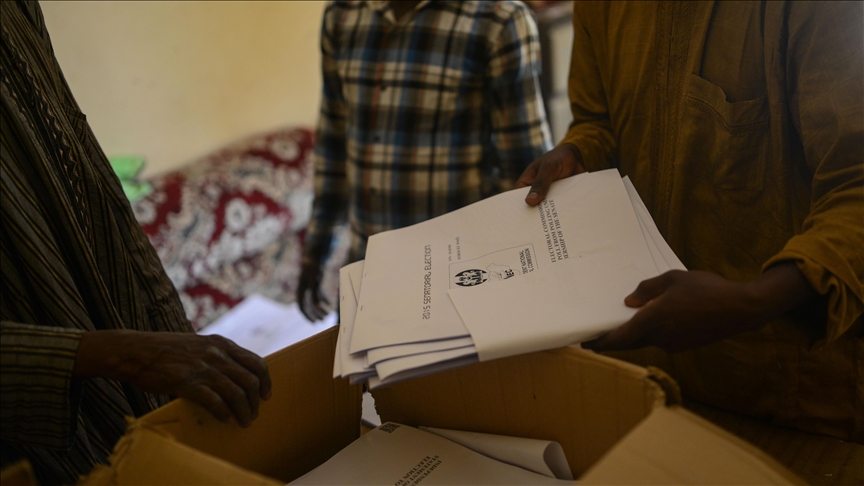ABUJA, Nigeria
Nigeria’s quest to conduct credible and peaceful elections next year is overshadowed by violence and threats of insecurity partly caused by a combination of desperation by politicians and existing security challenges in most parts of the country.
Attacks during political rallies have increased in recent times. Mid-November, the convoy of the opposition’s People’s Democratic Party (PDP) presidential candidate, Atiku Abubakar, was attacked by suspected hoodlums in Maiduguri, a northeast city believed to be a stronghold of the ruling party, All Progressive Congress (APC) shortly after his campaign rally.
A similar situation occurred the same week as some hoodlums also petted Ahmed Tinubu, APC presidential candidate, at the launch of his campaigns in Kano, the northwest city.
Nigerians are worried if they will be able to vote due to security concerns, especially with existing terrorist threats, banditry, violence from separatists’ agitations and other security challenges.
“My family members and I will stay off from the polling centers if this violence persists. It is frightening now,” 70 years old Abdul-Gafar Olagoke told Anadolu Agency from his southwest Osogbo town.
Incessant clashes among supporters of the leading political parties have ascerbated tension in the area, Olagoke said.
Rejoice Onuoha, an undergraduate 20, is unhappy her first opportunity to vote in her life may be truncated by security threats. She said she could not vote in 2019 because she did not meet the 18 years voting age prescribed by the country’s electoral law.
“I was looking forward to exercising my voting right next year for the first time in my life, but I’m scared at the spate of violence, killings, especially in my state Anambra,” she told Anadolu Agency.
More violent attacks and killings were reported in southeast Anambra State last week. Likewise, the office of the national electoral commission in Imo State, same region, was vandalized. Police blamed the separatist agitation group, Indigenous People of Bifra (IPOB), for the attacks though the group is yet to claim responsibility.
– Authority React
Authority said it is concerned about the increasing violence, asking politicians to caution their supporters and abide by the rule.
National Security Adviser, Babagana Monguno, said 52 political violence were recorded in 22 states between early October and November.
“This development is bad and must stop. The president has ordered that it must stop,” Monguno said in the capital, Abuja.
He said President Muhammadu Buhari has given a directive to all security agencies to ensure the 2023 election is held in an “atmosphere devoid of rancour.”
– Violence distracting the election process
At least seven offices of the Independent National Electoral Commission (INEC) with election equipment and materials in five states have either been burnt or vandalized by hoodlums since October.
Festus Okoye, a spokesman for the commission, said the violence could affect the next poll if it persists.
“The commission will replace the destroyed facilities before the election, but it may be difficult to replace them if attacks occur close to the election next year,” he explained.
Though he said the electoral body was in “close talks” with security agencies to secure election facilities, the civil society group believes these attacks are a target by politicians to distract the election process.
Head Partners for Electoral Reform in Nigeria, Ezenwa Nwagwu, blamed politicians for using violence rather than engaging with the electorates and civil societies on their manifesto.
“We need civic organizations and groups to set the agenda by inviting politicians to their platforms for meaningful exchanges that can be tracked afterward,” he told Anadolu Agency in Abuja.
Nigerians say next year’s election is critical to them. They express a strong desire to elect a new set of leaders in 30 of the 36 states of the federation and president to tackle increasing security problems, inflation, high cost of living and poverty.
A survey released recently by the national bureau of statistics (NBS) indicated 130 million Nigerians of the over 200 million population are “multi-dimensionally poor,” a sharp rise from 83 million people living below the poverty line three years ago (2019).
Patrick Utomi, a professor of political economy and management, insists a new leader should have the capacity to dissect and provide short and long-term to the country’s currency.
“Nigerians must elect a leader who has the capacity to analyze our current predicament but first, must address security because the economy cannot grow in an unsecured environment,” he declared.
A security expert and ex-army spokesman, Sani Usman, said patriotic Nigerians are worried about the escalation of political violence because of the implications on national security.
The retired army general advocated for the strengthening of intelligence by the security agencies to improve the protection of election facilities and the people.
Meanwhile, some Nigerians think there is nothing unusual about the increasing violence ahead of next year’s poll. One such is Umaru Pate, a leading professor of media and society in the country and University Vice-Chancellor.
Pate recalled in an interview with Anadolu Agency that a similar situation occurred in some parts of the country in 2015 and 2019.
“Some parts of the northeast were under Boko Haram terrorists in 2015, yet people were brought out of these areas to vote. I believe things will get better,” he maintained but asked politicians to engage more with the people.
Nigeria’s two previous elections, 2015 and 2019, were challenged by terrorist threats, especially in the country’s northeast, but the northwest, north-central and southeast did not experience banditry, kidnapping and separatist agitation then, unlike now.

